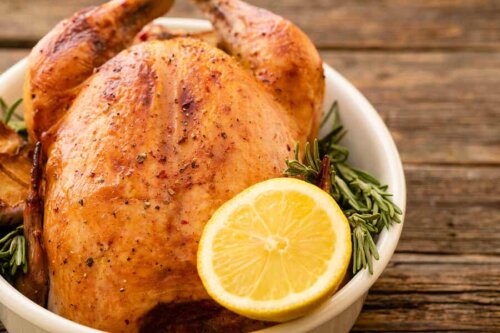A Review of the Pros and Cons of the Optavia Diet


Written and verified by the nutritionist Anna Vilarrasa
The Optavia diet is basically a weight loss or weight maintenance plan that blends a lean and green diet with certain ready-made products. It’s effective for weight loss but has been described by many experts as unhealthy. Today’s article will review it, so continue reading.
What’s the basis of the Optavia diet?
As we mentioned above, the Optavia diet is primarily a weight loss diet. It was promoted by a company called Medifast and prescribed by doctors back in the 1980s and 1990s.
Today, the program continues through an online platform that offers similar products. In it, people are to mix certain foods with special products the company produces. They refer to these as “fuels” and they come as bars, shakes, cookies, soups, and pasta, all of which have an equivalent nutritional profile.
The list of allowed foods includes:
- Fruits and vegetables such as lettuce, zucchini, celery, pepper, and cucumber
- Chicken and turkey as sources of lean protein
- Two servings of healthy fats like olive oil or avocado
The plan recommends six daily intakes and each person can make their own combinations of “fuels” and home-cooked meals. The most demanding plan advises taking five of their meals and a home-cooked one.
The intake of alcoholic and sugary drinks, coconut oil, butter, chocolate, and high-calorie desserts are to be skipped. Then, in a second phase, the dieter begins to introduce other foods such as fruit, legumes, and cereals.

How effective is the Optavia diet?
The Optavia diet is a weight loss diet, and effective as such. It can be quite low in calories — below 1,200 per day. This is approximately half of what a person eats with a standard diet that meets their energy needs.
As you can imagine, weight loss happens quickly if a person follows the indications. In addition, it’s a plan high in protein with a moderate intake of carbohydrates. Thus, you’ll lose a large volume of fluids at the beginning.
One of the positive points of this diet is the dieter is under the supervision of a health coach, who usually recommends 30 minutes of physical activity every day. As you can imagine, the clients are part of an active community that supports and advises them.
The diet is effective but has weaknesses
Below are the main handicaps of this weight loss plan.
Rapid weight loss in a short time
This rapid initial weight loss can lead to dehydration and loss of muscle mass. In contrast, there’s rarely any actual fat loss.
In addition, drastically restricting calorie intake leads to adverse effects such as a slowing of basal metabolism.
Find out How the Hormone Diet Works
Significant food restriction
There’s a restriction of some major food groups such as fruits, cereals, legumes, or nuts. The dieter introduces them at a later stage.
As you can see, they compromise their intake of some nutrients as a consequence. Indeed, all complementary foods are fortified, but it would be better to teach clients how to manage all the necessary rations instead of using substitutes with added nutrients.
It isn’t more effective in the long term
In a ranking of diets published by US News, some analysts – specialists in diabetes, cardiovascular health, and nutrition – concluded it’s unlikely that a person will maintain the lost pounds in the long term. Experts doubt that people won’t return to their previous eating habits.
In the same analysis, out of 27 types of diets – including the Mediterranean, vegan, and paleo – the Optavia diet was below average in terms of long-term effectiveness. In fact, it scored 2.2 out of 5, according to the opinion of the specialists.
Poor adherence
Another major problem with the Optavia diet is that it isn’t a way of eating that people can sustain over a long period of time. They just can’t adhere to it because it’s quite restrictive given that it’s satiating.
The fact that it restricts home-cooked meals and the foods people can eat at home makes it difficult to mix them with family meals, social engagements, or restaurant meals.

It doesn’t change eating habits
The goal of the Optavia diet is weight loss and, yes, it works because people reduce their calorie intake. It doesn’t change their eating habits though. Therein lies the problem with the vast majority of fast weight loss programs or “miracle diets.”
As you can imagine, people usually go back to eating the same way they did before and gain back the pounds they lost after achieving their desired weight. It sometimes happens quickly and in greater numbers.
High economic cost
A major part of the diet requires the consumption of “fuel” products that patients must buy in order to follow the dietary plan.
The prices for these aren’t reasonable either and the cost is huge given that the person must follow it for a long time.
People lose weight with the Optavia diet, but it isn’t a healthy one overall
After evaluating the pros and cons of the Optavia diet, we can say it’s effective for losing weight, but it isn’t healthy in the long term. Mainly because it’s hard to adhere to and quite pricey.
All cited sources were thoroughly reviewed by our team to ensure their quality, reliability, currency, and validity. The bibliography of this article was considered reliable and of academic or scientific accuracy.
- Arterburn LM et al. Randomized controlled trial assessing two commercial weight loss programs in adults with overweight or obesity. Obesity science and practice. Diciembre 2018. 21;5(1) 3-14.
- Obert J. et al. Popular Weight Loss Strategies: a Review of Four Weight Loss Techniques. Current Gastroenterology Reports . Noviembre 2017. 9;19(12):61.
- Redman LM, Ravussin E. Caloric Restriction in Humans: Impact on Physiological, Psychological, and Behavioral Outcomes. Antioxidants and Redox Signaling. Enero 2011. 15;14(2) 275-287.
- Zamora Navarro S, Pérez Llamas F. Errors and myths in feeding and nutrition: impact on the problems of obesity. Nutrición Hospitalaria. Septiembre 2013. 28 Suppl 5. 81-8.
This text is provided for informational purposes only and does not replace consultation with a professional. If in doubt, consult your specialist.








